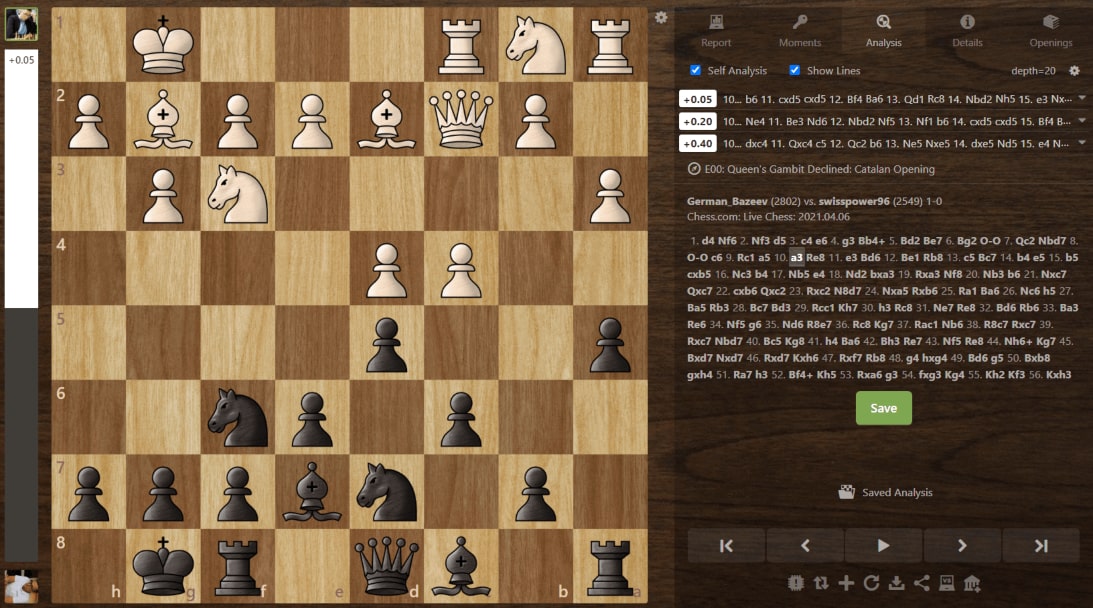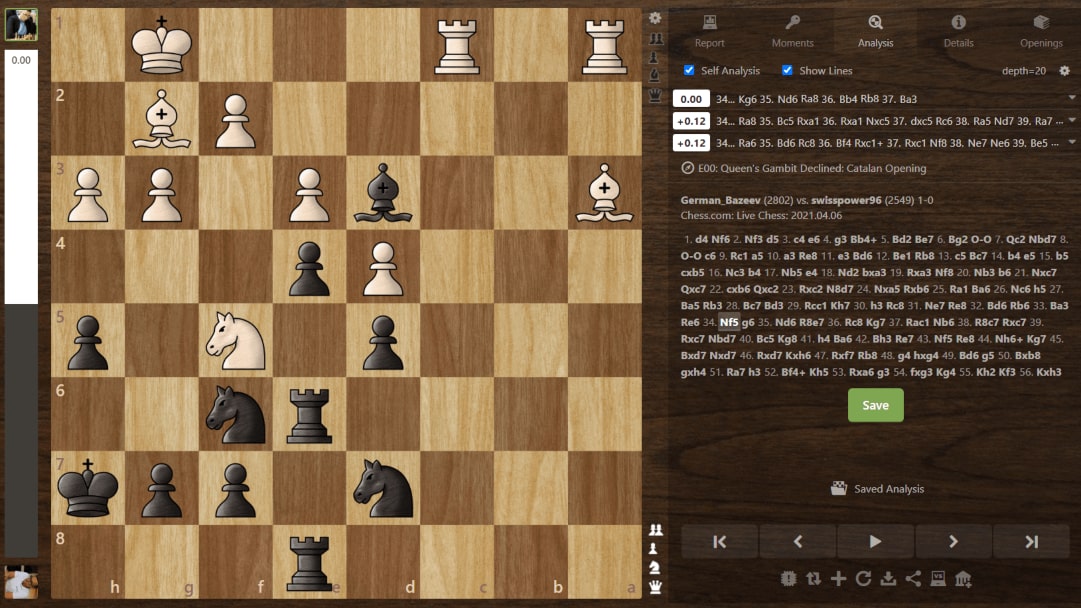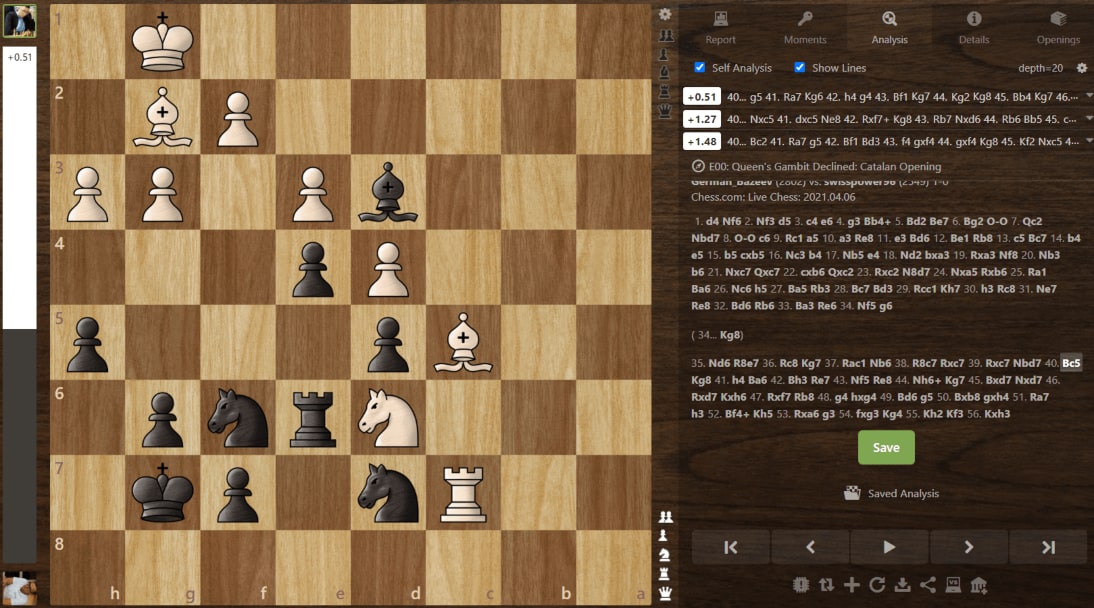Blitzing is fun. But it can slow down your improvement tremendously if done wrong. There is a big danger of learning faulty thinking.
After my posts (Part 1; Part 2) on the game analysis of classical games, it is time to take on Blitz games.
Same Mistake On Move 3 In Every Game
My father started to play in tournaments because of me. Instead of just sitting around and waiting for me to finish, he played himself. He has a respectable rating of around 1500 FIDE.
In order to get him started, I taught him some basic opening theories. We opted for the Petrov Defense with Black. I showed him some key ideas and he was ready to play.
He liked to play Blitz online. And like most of us, he never analyzed his games. So one day I come home from school and watch him play a Blitz game online: 1.e4 e5 2.Nf3 Nf6 3.Nxe5 Nxe4?
I look at him in disbelief and tell him that he was supposed to play d6 first. “But I have always played like this, you taught me that opening,” he said.
After I calmed down (that took some time!) I checked his Blitz games. In every single one, he made the same mistake. Always taking Nxe4 first.
He was lucky that most people did not know that after 4.Qe2 black is already in trouble! He cannot move the knight because of Nc6+ winning the queen.
So he has to protect with 4…d5 when after 5.d3 white at least comes out with a healthy pawn up.
He had successfully learned a grave mistake on move 3. How? By constant repetition! And not only that. He was firmly convinced that I taught him this horrible move. The small inclusion of 3…d6 4.Nf3 was completely forgotten.
Unlearning Is Harder Than Learning
The Problem with uncontrolled Blitzing is one key insight:
Unlearning is harder than learning.
I remember back in my school days learning some vocabulary for a foreign language. I studied French, Spanish & English. It was very easy to learn a new word. But once I had made a wrong connection, it was extremely hard to get that out of my head. The easiest way would be to delete what I learned and start from 0. But sadly that does not work.
The same was true for my father. Once he made that neural connection, it was really hard to unlearn. He finally did it, but it took quite some effort.
In order to avoid what happened to my Dad, you should absolutely analyze every single game you play. There is no way around it.
But Firouzja Is Also Playing Bullet All Day
Before you can even ask this question, I want to answer it myself. Yes, there are extremely strong players out there that play constant Blitz/Bullet and seem not to analyze their games. So, why does it work for them and not for you?
First of all, you should always ask yourself the following question:
Is this person great because of or despite that habit?
All of these Top Players have worked extremely hard next to their impulsive Bullet/Blitz chess.
I strongly doubt that any of them got great because of that habit. Their talent combined with their dedication makes them great. Not the constant Blitz/Bullet madness.
And because they are already so strong, they are much less keen to make mistakes and repeat them. With a certain strength you basically instantly understand if you make some huge mistake.
Your brain is wired to analyze what went wrong even during a game of blitz.
Having said that, as their Coach I would force them to analyze their games (if the goal is to improve in chess). The risk of automating some impulsive decisions is just too high.
So let Top Players be Top Players. Focus on yourself. Be ready to do some serious work or be ready to stagnate on your level forever. Your choice.
How To Analyse Your Blitz Games
Now that you know the risk, I hope you are ready to analyze every game.
Knowing what you should do, but not doing it is either laziness or stupidity. And if you feel attacked by that sentence it is time to kick some ass and do what you should do!
Don’t worry, I don’t even have the slightest hope that you would do a thorough analysis of your Blitz games. It is also not necessary to do so. This process is super easy. That is why I am so surprised that most people are still not doing it.
The most important part is to make sure you don’t tilt. Because when emotions get to you, even the best analysis can not help you improve. Make sure to be focused and play well. If you struggle with it, read my article on tilting.
As it is purely topical to analyze a game directly after playing it, I will do the analysis after a block of games. I usually go for 6 games and then analyze them. The game analysis is very easy, I do the following:
- Improve the opening play.
- Watch out for big/game-losing mistakes.
- Note the patterns of the mistakes (tactics, strategy, opening, endgames).
I will lead you through it with an example of mine. This game was played in a recently titled Tuesday tournament. You can check the game yourself here.
Focus On a Few Instructive Moments

In this position, I thought for 20 seconds before playing Re8?. In order to do better next time, I will check my opening file for Catalan Bb4+ shortly (If you have no idea what an opening file is, then check out this great thread from adult improver Nate Solon. I will certainly write about that topic shortly here on the blog).
I see that I am supposed to play 10…b6! 11.cxd5 cxd5 with the idea of Ba6. In a few seconds, I improved my memory of my opening lines. I will not make the same mistake again.
If you happen to face something you do not have in your analysis yet, either do the analysis now or write it somewhere as a to-do.
YOU WILL NOT REMEMBER TO DO IT IF IT IS NOT WRITTEN SOMEWHERE.
The game continued with many small inaccuracies. These do not really matter. I will never expect myself to play perfectly in a Blitz game. So I will play through without stopping until there is a big mistake.

Here I played the naive 34…g6? and after 35.Nd6 (which was anyway white’s idea!) my position is very awkward. I have to protect f7 by putting the rook on e7 or f8. With every move now there is the threat of moving the d6 knight to attack my rook.
If I would have taken a second to think “what is his idea?” I would immediately get that Nd6 is the threat. While I cannot stop it, I can either protect f7 by Kg6/Kg8 or move my rook from e8 so it does not hang after Nd6. The mistake thus goes into the category: of opponents’ resources.
Later in the game, I had one more chance. Again it is all about opponents’ resources/plans.

My position is really cramped. As you see, g5 puts up great resistance. But why? Because the winning idea is h4! followed by Bh3 for white. So g5 is pure prophylaxis, so I can play g4 whenever white tries to push h4.
Even though this is a tough move to find if I ask myself “what is his idea” I am sure I can spot it also in a Blitz game.
Conclusion
Here is what I improved from one single blitz game:
- I better feel and memory of my opening
- Understanding one of my weaknesses: opponents’ resources
- A great example of prophylaxis in defense
All of that by just taking some minutes to look at my own Blitz game.
So join me in the movement to analyze every single game of yours.
It works and is much less painful than doing the same mistakes over and over again.
Sincerely,
Noël
P.S: If you liked this article, you would love my E-Book, The Art of Chess Training. Download it here for Free.